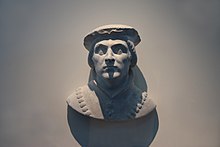"Dauphin of Viennois" redirects here. For the heirs to the French throne, see Dauphin of France.
| This article needs additional citations for verification. Please help improve this article by adding citations to reliable sources. Unsourced material may be challenged and removed. Find sources: "List of counts of Albon and dauphins of Viennois" – news · newspapers · books · scholar · JSTOR (June 2016) (Learn how and when to remove this message) |

The counts of Albon (French: comtes d'Albon) were members of the medieval nobility in what is now south-eastern France.
Guigues IV, Count of Albon (d. 1142) was nicknamed le Dauphin or 'the Dolphin'. His nickname morphed into a title among his successors. By 1293, the lands ruled by the Counts Albon, the old comitatus Albionis, were known as the Dauphiné of Viennois (Latin: Dalphinatus Viennensis).
The titles and lands had been part of the Holy Roman Empire since 1032. They passed to Philip VI of France in 1349 on condition that the heir apparent to the French crown always be titled dauphin, and be personal holder of the lands and titles. By condition of the emperor, the Dauphiny could never be united to France. When the king of France had no son, he would personally rule the Dauphiny separately, as dauphin. Thus, the province technically remained in the Holy Roman Empire even after 1349, and it was administered separately from France well into the early modern period; it was incorporated into France only de facto with the rise of absolutism in the 17th century.
Lords of Château d'Albon
House of Albon
- Guigues I of Albon the Old (c. 1000–1070), Count in Oisans, Grésivaudan and Briançonnais, Lord of Château d'Albon, ruled until 1070
- Guigues II of Albon the Fat (c. 1020–1079), Count in Grésivaudan and Briançonnais, Lord of Château d'Albon, ruled 1070–1079
Counts of Albon
House of Albon
- Guigues III of Albon the Count (c. 1050–1133), first Count of Albon (the southern part of the ancient County of Vienne; the northern part was granted to the first Count of Savoy), ruled 1079–1133
- Guigues IV of Albon, le Dauphin (c. 1095–1142), Count of Albon, ruled 1133–1142
Counts of Albon and Dauphins of Viennois
- Robert V, Count of Auvergne married Marquise d'Albon, a daughter of Guigues IV. Their descendants adopted the title of Dauphin of Auvergne, and it was used by some as the family name.
House of Albon
- Guigues V of Albon (c. 1120–1162), Count of Albon and Grenoble, Dauphin of Viennois, ruled 1142–1162
- Béatrice of Albon (1161–1228), Dauphine of Viennois, Countess of Albon, Grenoble, Oisans et Briançon, ruled 1162–1228, married Hugh III of Burgundy
House of Burgundy
- Guigues VI of Viennois (1184–1237), Dauphin de Viennois, count of Albon, Grenoble, Oisans and Briançon, ruled 1228–1237
- Guigues VII of Viennois (c. 1225–1269), Dauphin of Viennois, Count of Albon, Grenoble, Oisans, Briançon, Embrun and Gap, son of, ruled 1237–1269
- John I of Viennois (1263–1282), Dauphin of Viennois, Count of Albon, Grenoble, Oisans, Briançon and Embrun, ruled 1269–1282
- Anne of Viennois (1255–1298), Dauphine of Viennois, Countess of Albon, married Humbert, Baron of La Tour du Pin
House of La Tour du Pin

- Humbert I of Viennois (c. 1240–1307), Baron of La Tour du Pin, Dauphin of Viennois and Count of Albon, ruled 1282–1307
- John II of Viennois (1280–1318), Baron of La Tour du Pin, Dauphin of Viennois, ruled 1307–1318
- Guigues VIII of Viennois (1309–1333), Dauphin of Viennois, ruled 1318–1333
- Humbert II of Viennois (1312–1355), Dauphin of Viennois, ruled 1333–1349
Humbert II sold his lands and titles to Philip VI of France.
Dauphins of Viennois and Dauphins of France
House of Valois
- Charles I of Viennois (1338–1380), also king of France as Charles V, Dauphin of Viennois, Count of Diois and Valentinois, Duke of Normandy, ruled the dauphinate as the first Dauphin of France (1350–1364) and ruled the dauphinate as king of France (1364–1368)
- Charles II of Viennois (1368–1422), also king of France as Charles VI, Dauphin of Viennois, Count of Diois and Valentinois, ruled the dauphinate as second Dauphin of France (1368–1380), ruled the dauphinate as king of France (1380–1386) and again during (1386–1392)
- Charles III of Viennois (1386), Dauphin of Viennois, Count of Diois and Valentinois, ruled the dauphinate as third Dauphin of France (1386)
- Charles IV of Viennois (1392-1401), Dauphin of Viennois, Count of Diois and Valentinois, Duke of Guyenne, ruled the dauphinate as fourth Dauphin of France (1392–1401)
- Louis I of Viennois (1397–1415), Dauphin of Viennois, Count of Diois and Valentinois, Duke of Guyenne, ruled the dauphinate as fifth Dauphin of France (1401–1415)
- John III of Viennois (1398–1417), Dauphin of Viennois, Count of Diois and Valentinois, Duke of Touraine, ruled the dauphinate as sixth Dauphin of France (1415–1417)
- Charles V of Viennois (1403–1461), also king of France as Charles VII, Dauphin of Viennois, Count of Diois, Valentinois and Ponthieu, ruled the dauphinate as seventh Dauphin of France (1417–1422), ruled the dauphinate as king of France (1422–1423, de facto 1457-1461)
- Louis II of Viennois (1423–1483), also king of France as Louis XI, Dauphin of Viennois, Count of Diois and Valentinois, ruled the dauphinate as eighth Dauphin of France (1423–1461), ruled the dauphinate as king of France (1461–1466)
See also
Notes
- Bernard Bligny (1984), "Note sur l'origine et la signification du terme "dauphin" (de Viennois)", Actes des congrès de la Société des historiens médiévistes de l'enseignement supérieur public, 15 congrès, 15 (1): 155–56.